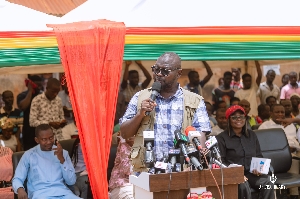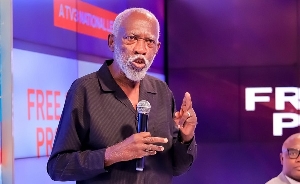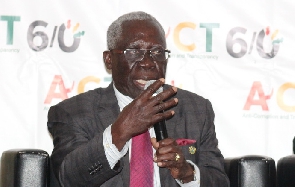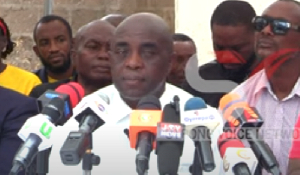Samuel Dowuona, Adom FM
“Anywhere I travel to as Health Minister and I meet the Ghanaian community, I’ve always entreated our doctors, particularly those who are no more in active service to come back – most of them will come for rural areas where at least they can do consultancies and prescriptions and diagnostics - there are bureaucracies I must admit, people know the gap in terms of the patient-doctor ratio, but quite often you have even people who sit there and use all sorts of bureaucratic mechanisms to create delays and frustrations for people (the doctors), but we are working gradually through it to see how we can get round it.”
Those were the words of Minister of Health, Dr. Benjamin Kumbuor in an interview with yours truly recently, on the issue of systemic bureaucracies in the way of efforts to get Ghanaian doctors and other health professionals living and working abroad to come and help our ailing health sector.
President John Evans Atta Mills recently appealed to Ghanaian health professionals in the Diaspora to come and help. As a good steward, Dr. Kumbour felt obliged to carry through the president’s bidding, and that is why he goes round the world inviting Ghanaian health professionals to come home.
But the poor minister could also not hide his frustration that, ‘some people’ deliberately put bureaucratic stumbling blocks in the way of the doctors from coming and in the process they stifle the minister’s efforts and rubbish the president’s call.
Who are those ‘people’ that the minister is referring to - and what motivates them to take a stance that runs counter to the bidding of the president, efforts of the minister and the interest of the people of Ghana? It might interest the public to know that the contentious bureaucratic dinosaurs the minister is referring to are the people at the Ghana Medical and Dental Council (GMDC); and recently, yours truly found out that some the dinosaurs have also pitched camp at the Ghana Health Service (GHS).
The main contention is about registration fees for health professionals from the Diaspora coming in country to do voluntary service. The minister, previous health ministers, a cross-section of Ghanaians, and the doctors from the Diaspora think the temporary registration fee of $400 should be waved since they are coming to help Ghanaians for free.
But the GMDC and the GHS think the registration fee is enshrined in the law and so the only way the fee can be waved is when the law is amended. They also argue that the matter goes beyond registration fee to verifying the qualification and competence of the Diasporan health professionals. The law that established the GMDC is the National Revolutionary Council Degree (NRCD) 91 of 1972. The law gives the GMDC the powers to keep a register of qualified medical and dental practitioners in the country. The law is not emphatic on practitioners paying fees, but the GMDC has operationalised the law and distinguished between permanent and temporary registration with respective requirements and fees.
There are no qualms about that because it is common practice around the world for qualified practitioners to pay registration fees. The question has been about the category of practitioners who should pay and register.
The most recent argument begun from 2007, when the then Health Minister, Major Courage Qaurshigah oF blessed memory asked the Ghana Doctors and Dentists Association (GDDA) in the UK to play a significant role in the health aspect of the Ghana@50 celebrations.
The Ghanaian-UK doctors set up a programme to come to Ghana and do voluntary service all year round. The then President of the GDDA, Professor Samuel Debrah told yours truly the programme was designed to ensure that teams of Ghanaian health professionals from the UK will come to Ghana for two weeks every month and do voluntary service at the most deprived hospitals, clinics and health posts across country; and also do on-the-job training and in the medical schools. Originally, the ministry of health was to pay for their trips to Ghana and to the deprived areas to offer their free services. That would have cost the country millions of dollars over time, but the Migration for International Development Assistance (MIDA) of the International Organization on Migrations (IOM) offered to foot the travel bills and the doctors started their programme in 2008 under the joint auspices of the ministry and the Ghana High Commission in the UK.
The programme was running fine until the GMDC, waged into the fray supposedly to ensure some sanity.
The law gives GMDC the power to register all doctors and dentists in the country at a fee and also ensure that they keep improving on their competence in order to keep practicing. The idea is to ensure safety for Ghanaians, as many citizens have died or suffered one misfortune or the other at the hands of incompetent doctors in this country. The role of the GMDC is a noble one and very important, to the extent that it goes to protect Ghanaians from falling prey to quack or half-baked health professionals.
Indeed, similar regulatory bodies exist in countries all over the world, and they charge fees for licensing qualified health professionals before allowing them to practice in their respective countries.
The GMDC therefore demanded that the Ghanaian doctors from the Diaspora coming in to do brief voluntary services should pay the registration fee for three-month temporary licenses before they can offer their services in Ghana for free. Former Minister of Health, Dr. George Ajah Sipa Yankey asked the GMDC to register the doctors from the Diaspora but wave the registration fee since the doctors are coming in to do voluntary service. Indeed, Dr. Kumbour also shares the opinion of his predecessors and has been making efforts to wave the fees to enable the doctors come.
But the Director-General of the Ghana Health Service, Dr. Elias Sori surprisingly supports the stance of the GMDC and says that people like Dr. Kumbour, Dr. Sipa Yankey and the late Major Quashigah are just politicians who have no control over the legal and technical matters. Dr. Sori told yours truly in an interview that “no politician can say the law should be broken…if it is that the politicians want the law to be changed then they should say that but as long as the law remains, the GMDC has a responsibility to uphold the law.”
Dr. Sori said he paid and registered and he keeps paying to regularize his license, so the Diasporan doctors must also pay even if they are coming in to do voluntary service.
“Coming in to do voluntary service does not mean you should not pay…why can’t they stay in this country and do voluntary service…in the first place these people left this country when we needed them most and now coming back is a problem…the fee is just a token, we will not wave it, and if people are really serious they will pay even if it is $1,000…I think people are not being patriotic in this country,” says Dr. Sori.
Clearly, Dr. Sori has taken the “we and them” stance, with total disregard for the hard facts on the ground. Like the minister said, people like Dr. Sori and the members of the GMDC are fully aware of the doctor-patient ratio and yet they glory in the bureaucracies and in protecting the law at the expense of the health of the masses.
The hard facts about Ghana’s health sector is that 37 per cent of doctors trained in Ghana live and work abroad and currently the doctor/patient ratio is one doctor is to over 20,000 patients.
The President’s call is clear; his ministers took the steps and got result; but the regulator (GMDC) and their allies (GHS) have firmly put stumbling blocks in the way, in the name of upholding the laws and protecting Ghanaians from the possible danger of falling into the hands of half-baked doctors from the Diaspora. The regulator and GHS have what it takes to check the backgrounds of the doctors and verify their qualification and competences, and yet they keep throwing that in as if it is some rocket science.
The Diasporan doctors in the UK have been hosting these GMDC/GHS folks every year in workshops and dinners, and sometimes the GMDC/GHS members take the opportunity to get free specialist care and checkups from these same doctors, and yet when it comes to helping them to come offer free service in Ghana they raise questions about their competences and qualification.
Isn’t that what we call double standards? And some Ghanaians have also had their say on the matter, describing the GMDC and GHS as ‘wicked’ and ‘saboteurs’ because they are denying Ghanaians of free specialist health care and also stifling the efforts of the government.
In spite of the President’s calls, the various health ministers’ efforts and the cries of the masses, the moral side of the argument does not make sense to the GMDC and the GHS.
They are bent on protecting the written code and rubbishing the unwritten law, which is the obvious truth about our doctor-patient ratio, the shambles in our hospitals, the refusal of homeland doctors to accept postings to deprived areas, and the practice where some doctors in government hospitals transfer cases to their private hospitals and make money off poor Ghanaians.
In the face of this adamancy by the GMDC and GHS I would like to propose that we look at the law they claim to be protecting (NRCD 91, 1972) and consider an amendment that will allow qualified Ghanaian health professionals coming from the Diaspora to do voluntary service to be registered and licensed for free. For crying out loud, the law we are talking about it a military de facto government decree and it is as old as 38 years old without any amendment. Even our 18-year old, 1992 Constitution is billed for review soon; what about the archaic 1972 military degree that has obviously lost touch with the realities of our present and is posing an obvious threat to our people.
It is my opinion that we cannot compare ourselves to the west where they can afford to charge fees from doctors doing voluntary service in their countries because they do not have a problematic doctor-patient ratio and, unlike Ghana those countries can also afford to pay huge sums for specialists to go work in their countries on commercial basis.
Like Dr. Elias Sori rightly said, if it has to take an amendment of the law to save out people, so be it.










